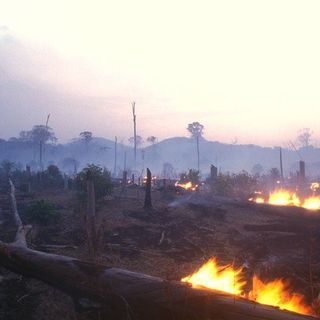Falling groundwater levels across the country, and a lack of any immediate means to compensate, could reduce India’s winter crop acreage by 20% and threaten its food security, a new study has warned.
“Understanding the complex relationship between food security and water availability is crucial as we prepare for future rainfall variability due to global climate change,” Gillian Galford, a research associate professor at the University of Vermont who was involved in the study, said in a statement.
Published in Science Advances, the study analyzed irrigation methods used in more than 500,000 Indian villages to estimate losses in crop production due to the depletion of groundwater.
Switching to canal irrigation was previously considered a way to make up for groundwater shortfall, but the study notes that the irrigation method cannot fully offset the lost groundwater. Even if all the regions experiencing the shortfall switch to irrigation canals, which divert surface water from lakes and rivers onto farms, the total winter crop acreage would still fall by an average of 7% across the country — and by 21-24% in the most critically depleted regions.
According to the study, the biggest challenge to canal irrigation substituting groundwater is the existing distance between canals and farmlands that grow winter crops. Moreover, since canal irrigation depends on lakes and rivers — which in turn depend on rainfall — farmers would have to depend on rainfall, too. And unlike groundwater reserves, rainfall fluctuates, and ever more variably due to climate change.
Related on The Swaddle:
Water Is Now a Traded Commodity; Can It Still Be a Human Right, Too?
Additionally, the researchers note that reliance on surface irrigation could increase inequity since farmers from all regions don’t have similar degrees of canal access.
The primary cause for groundwater depletion is the rapid, continuous, excessive pumping required to produce enough food for India’s growing population, which keeps water-intensive crops like rice and wheat in high demand. This allows groundwater reserves no time to replenish, a loss experts say is sped by climate change.
The study suggests a handful of measures to alleviate the strain on food security: switching to the cultivation of less water-intensive cereals in the winter, adopting sprinklers and drip irrigation sysems, which conserve water, or formulating policies to increase the efficiency of, and perhaps even access to, irrigation canals.
“Our results highlight the critical importance of groundwater for Indian agriculture and rural livelihoods. … These findings suggest that other adaptation strategies, in addition to canal expansion, are needed to cope with ongoing groundwater losses,” Meha Jain, assistant professor at the University of Michigan and co-author of the study, said in a statement.




